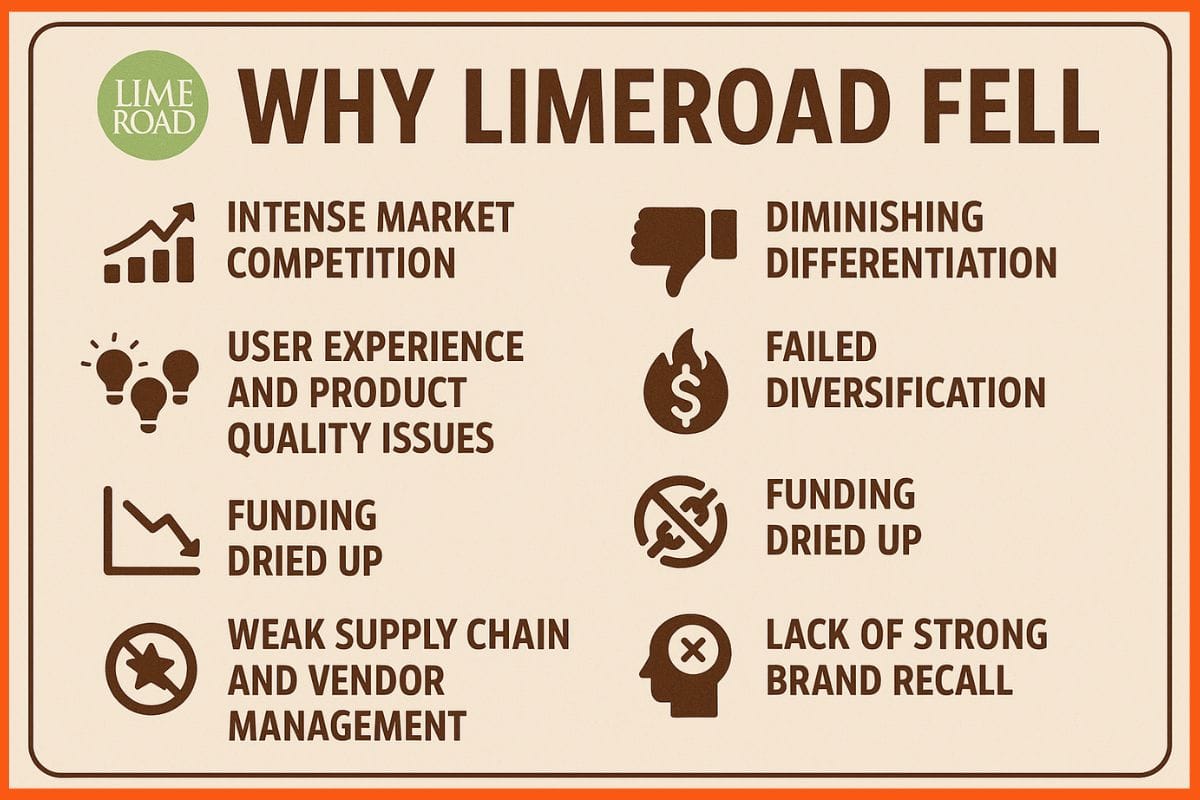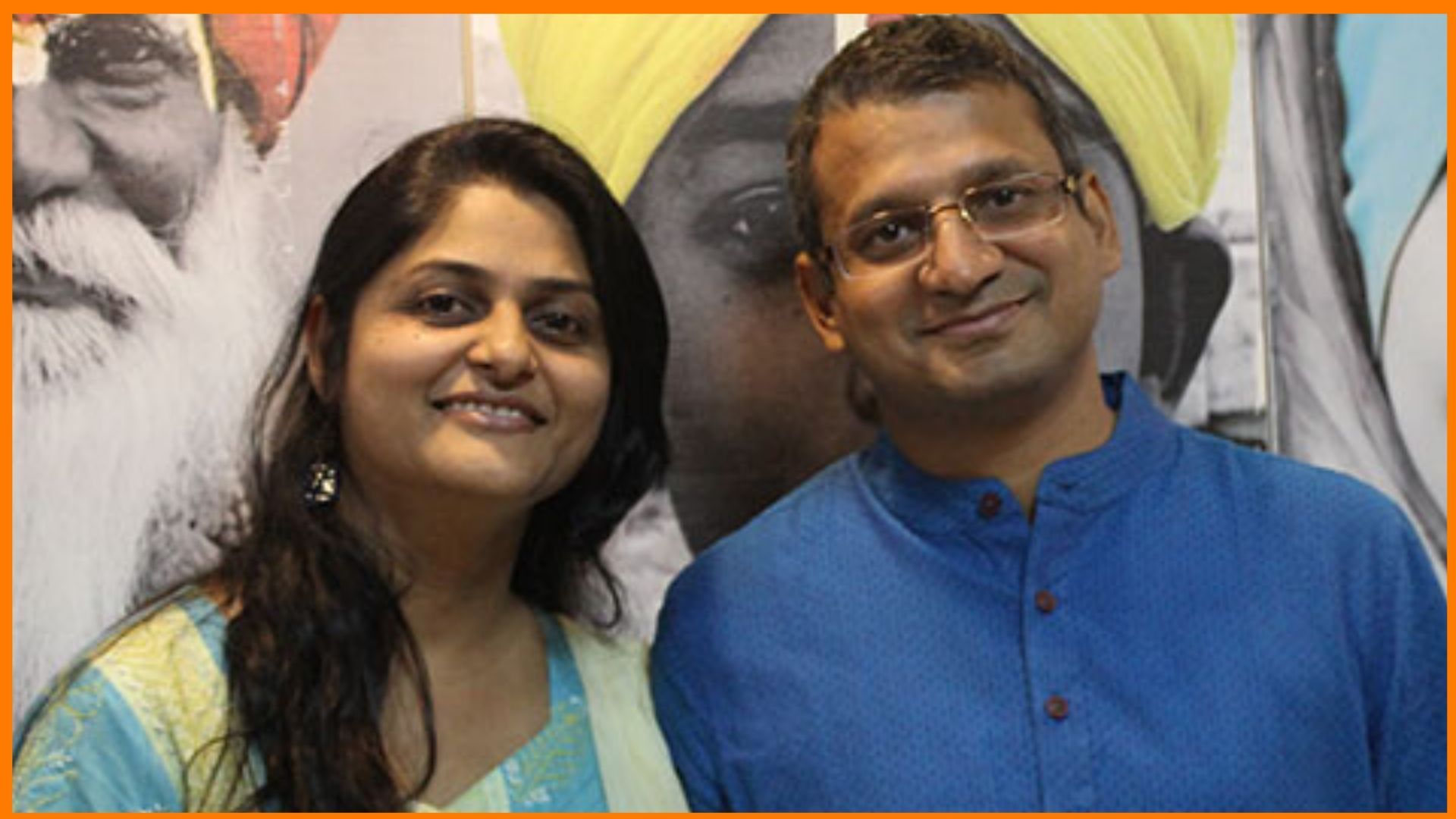During the era of Flipkart and Myntra dominating India’s fashion e-commerce market, LimeRoad entered the scene back in 2012. Unlike the usual catalog-based shopping platforms, LimeRoad came up with a refreshing idea: a Pinterest-meets-fashion experience where users could mix, match, and create looks using virtual scrapbooks.
With big investors like Tiger Global on board and a promising growth curve, LimeRoad looked poised to challenge even the most established players in the market. But fast-forward to 2022, and the once-thriving startup was sold for a fraction of its value in what many call a “distress sale.” Let’s find out why it failed.
LimeRoad’s Rise Story: How The Startup That Shook Up E-Commerce (2012–2015)
What Made LimeRoad Stand Out?
LimeRoad Funding
The Decline Begins: Rising Competition and Falling Revenues (2019–2022)
Where LimeRoad Struggled?
Why LimeRoad Fell: 8 Key Reasons Behind the Collapse
What’s Next for LimeRoad Under V-Mart?
LimeRoad’s Rise Story: How The Startup That Shook Up E-Commerce (2012–2015)
Suchi Mukherjee, who previously worked with eBay, Skype, and Gumtree, co-founded LimeRoad in 2012 alongside Prashant Malik, one of Facebook’s early engineers, and Ankush Mehra, former head of supply chain at Reliance Hypermarkets.
LimeRoad entered the Indian e-commerce space with a fresh and bold vision: to turn online fashion shopping into a social discovery experience. Its rapid growth earned it a loyal user base and widespread recognition. It was named Coolest Startup of the Year by Business Today in 2015 and received the Unicorn Startup Award from NDTV in 2016.
What Made LimeRoad Stand Out?
- LimeRoad is inspired by Polyvore (a U.S. fashion social commerce platform).
- It focuses on women shoppers and combines shopping with social features so users can create and share fashion looks and style boards.
- 90% of products and looks on the platform are user-generated content, making it more like a fashion community than a store.
- The company is seeing 45% month-on-month growth in mobile traffic, mostly from organic sources.

LimeRoad Funding
Series A
LimeRoad secured $5 million in Series A funding in 2012, led by Matrix Partners India and Lightspeed Venture Partners.
Series B
LimeRoad raised $15 million in its Series B round, led by Tiger Global Management, a New York-based investment firm. Existing investors Lightspeed Venture Partners and Matrix Partners India also participated in the round.
Series C
LimeRoad announced a $30 million Series C funding round led by existing investor Tiger Global Management, with continued participation from Lightspeed Venture Partners and Matrix Partners India. This follows its $15 million Series B round in May 2014, bringing its total funding to over $50 million.
Growth and Performance
- LimeRoad’s Gross Merchandise Value (GMV) grew by 600% in one year.
- 80–85% of orders come from repeat customers, showing strong user loyalty.
- It is estimated to be generating around Rs 100 crore in revenue and is expected to continue growing
The Decline Begins: Rising Competition and Falling Revenues (2019–2022)
By 2019, India’s fashion e-commerce landscape had changed dramatically. Giants like Myntra, Ajio, Flipkart Fashion, and Amazon Fashion had cemented their dominance with:
- Deep financial backing
- Influencer-driven marketing campaigns
- Fast delivery logistics (including same/next-day shipping)
LimeRoad, once seen as a rising star, began losing ground.
Where LimeRoad Struggled?
Product Quality Issues
Users on platforms like Twitter, app stores, and review sites began highlighting:
- Poor fabric quality
- Frequent delivery delays
- Unresponsive or inadequate customer service
Marketing Fatigue
LimeRoad’s innovative “style scrapbook” feature, which allowed users to curate and share looks, lost its edge as competitors introduced similar discovery tools. The novelty wore off.
High Burn Rate
Running a user-curated, community-driven platform meant:
- Constant engagement efforts
- High customer acquisition costs
- Significant content moderation and tech upkeep
These challenges strained LimeRoad’s finances. But LimeRoad kept losing more money, its sales dropped, and it struggled to raise new funds. In FY22, it earned only INR 69 crore in revenue, a fall of over 61% compared to FY20.
Why LimeRoad Fell: 8 Key Reasons Behind the Collapse

Despite early success and strong investor backing, LimeRoad couldn’t sustain its momentum. Here’s a breakdown of the main reasons behind its downfall:
Intense Market Competition
LimeRoad struggled to compete with deep-pocketed rivals like Myntra, Ajio, Flipkart Fashion, and Amazon Fashion. These platforms offered:
- Wider product selections
- Attractive discounts
- Faster delivery through robust logistics
LimeRoad, being a niche player, couldn’t match this scale or speed.
User Experience and Product Quality Issues
Negative reviews on social media and e-commerce forums pointed to:
- Inconsistent product quality
- Delayed shipments
- Poor customer support
These issues damaged customer trust and loyalty.
Diminishing Differentiation
LimeRoad’s initial edge came from its style scrapbook feature and a social shopping experience that let users curate looks, follow others, and discover trends in an interactive way, something that felt fresh and engaging in the early 2010s.
However, over time, this uniqueness faded:
- Copycat Features: Major players like Myntra and Ajio integrated similar discovery and personalization tools, like trend feeds, influencer lookbooks, and AI-based style suggestions, neutralizing LimeRoad’s competitive edge.
- Low Brand Evolution: While competitors continuously refreshed their user interface, brand communication, and content formats (like reels and influencer stories), LimeRoad’s platform began to feel outdated and lacked innovation.
- Mobile-First Era Shift: As fashion consumption shifted heavily to mobile, LimeRoad couldn’t keep up with the design trends and interactive experiences that users expected from newer, mobile-optimized platforms.
High Operational Burn
Running a user-generated content platform meant high costs in:
- Content moderation
- Community engagement
- Marketing and tech maintenance
Without sufficient revenue, these costs became unsustainable.
Failed Diversification
LimeRoad ventured into menswear, kidswear, and even home & kitchen products to expand its market. It also experimented with offline experiential stores. However, none of these bets paid off, leading to further losses and a diluted brand identity.
Funding Dried Up
After its last known funding round in 2020 ($1.5 million), LimeRoad failed to raise significant capital. With declining revenue and rising losses, investor confidence dwindled, making it hard to survive in a capital-intensive sector.
Weak Supply Chain and Vendor Management
Unlike larger rivals, LimeRoad lacked a strong vendor ecosystem. Inconsistent product listings, stock-outs, and quality control issues hurt the shopping experience and damage customer retention. Its inability to offer a reliable and fast delivery network further eroded customer trust.
Lack of Strong Brand Recall
While platforms like Myntra and Ajio aggressively built aspirational brands through influencers and advertising, LimeRoad failed to maintain top-of-mind recall, especially among Gen Z and Tier 1 consumers. Its limited marketing spending and inconsistent brand messaging made it hard to compete in a crowded market.
What’s Next for LimeRoad Under V-Mart?
LimeRoad has been acquired by V-Mart Retail in a slump sale for just INR 31 crore in cash, less than one-tenth of the INR 350+ crore it raised over the years from investors like Tiger Global, Matrix Partners India, and Lightspeed Venture Partners.
Despite early success and $50 million in funding between 2012 and 2015, LimeRoad’s growth stalled. A small $1.5 million infusion in 2020 couldn’t revive momentum. Now, with over 1.7 crore users, the platform will help V-Mart build its omnichannel presence.
V-Mart plans to invest an additional INR 150 crore into LimeRoad and retain it as an independent unit to preserve its startup culture. CEO Suchi Mukherjee will lead V-Mart’s omnichannel business, while Ankush Mehra will stay on as COO of LimeRoad. Currently, V-Mart operates 410 retail stores across 254 cities and aims to become a full-fledged omnichannel player within 2–3 years.
LimeRoad’s story is both inspiring and a warning. It started as one of India’s most creative fashion startups but ended in a distress sale within 10 years, showing how tough the startup world can be. It’s a reminder that in the startup world, big ideas must be backed by sharp execution and constant adaptation. Whether it makes a comeback or fades away now depends on how well V-Mart can revive it and how customers respond.
FAQs
What is LimeRoad and how did it start?
LimeRoad is an Indian fashion e-commerce platform founded in 2012 by Suchi Mukherjee, Prashant Malik, and Ankush Mehra.
Why was LimeRoad considered innovative in the Indian fashion e-commerce space?
LimeRoad stood out by combining shopping with social discovery. Users could curate style scrapbooks, follow others, and shop user-generated fashion content — a concept inspired by U.S.-based Polyvore.
What caused LimeRoad to fail despite early success?
LimeRoad’s downfall was due to rising competition, poor product quality, high operational costs, failure to innovate, weak supply chain management, and an inability to raise sufficient funds post-2020.







































